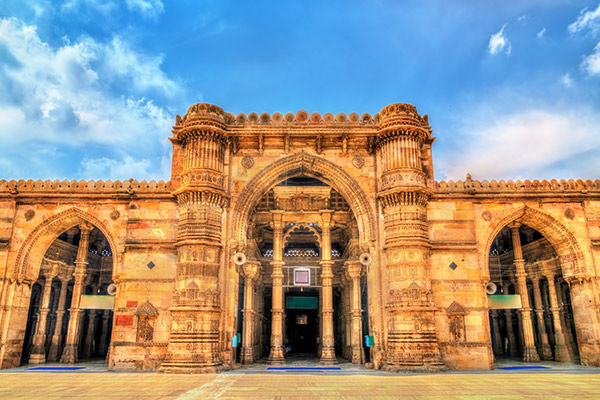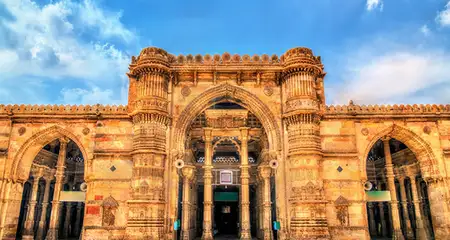Ahmedabad was founded by Sultan Ahmed Shah of Muzaffarid dynasty in the 15th century as the new capital of Gujarat Sultanate. In the years that followed, the city remained under the dominion of different empires and dynasties including the Marathas and the Mughals. Many of them left behind their influence on the city’s architectural landscape. So it’s not a surprise that there are myriad historical places in Ahmedabad that bear testimony to its rich past.
Are you eager to explore the heritage beauty of the city? Here’s a list of some historical sites that are a must-visit once you step out of your hotels in Ahmedabad.
Historical Places in Ahmedabad:
| Sabarmati Ashram | Ashram Road |
| Bhadra Fort | Court Road |
| Teen Darwaza | Court Road |
| Sarkhej Roza | Sarkhej Makarba Road |
| Jama Masjid | Manek Chowk |
| Shah-e-Alam’s Roza | Shah Alam Road |
| Rani no Hajiro | Manek Chowk |
| Hutheesing Jain Temple | Shahibaug Road |
| Dada Harir Vav | Haripura |
| Siddi Saiyed Mosque | Gheekanta |
| Calico Textile Museum | Airport Road |
| Adalaj Vav | Adalaj |
| Jhulta Minara | Sakar Bazar |
1. Sabarmati Ashram, Ahmedabad
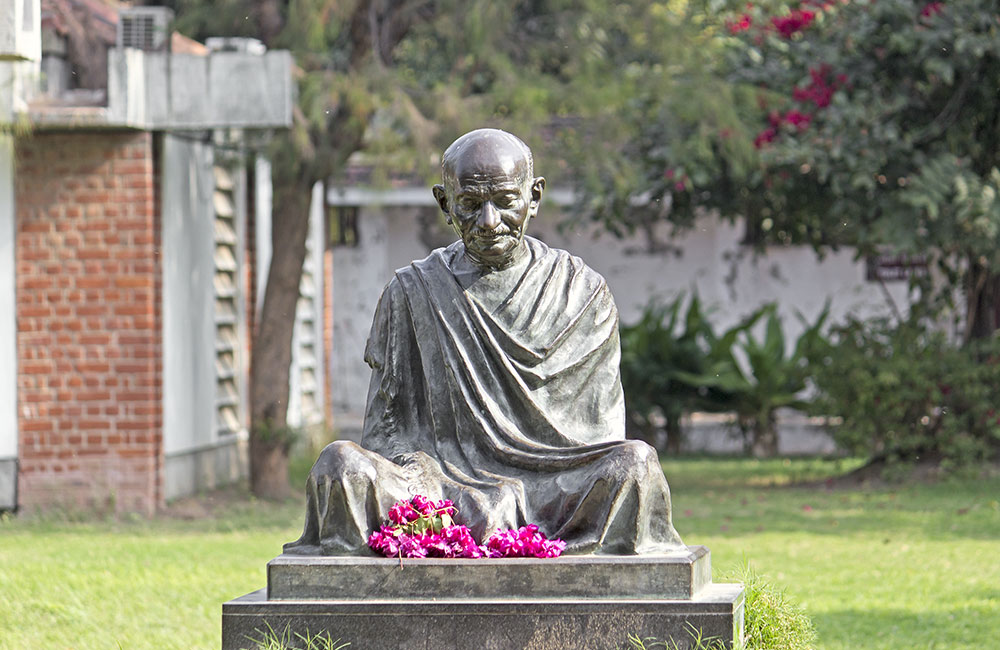
Sabarmati Ashram | #1 of 13 Historical Places in Ahmedabad
Sabarmati Ashram served as the residence of Mahatma Gandhi and his wife, Kasturba, for a long time. Situated on the banks of Sabarmati River, this serene ashram is perhaps the most famous of all historical places in Ahmedabad. It is built over an area of 36 acres and is often referred to as the Gandhi Ashram.
The ashram played a key role in India’s freedom movement too. It was the base from where Bapu led the Salt Satyagraha or Dandi March on 12th March 1930. There’s a museum inside the ashram, called Gandhi Smarak Sangrahalaya, where you can see artifacts related to his life, including his writing desk, some personal letters and photographs, and khadi kurta.
- Location: Ashram Road, Ahmedabad
- Timings: 8:30 am to 6:30 pm
- Entry Fee: Free
2. Bhadra Fort, Ahmedabad
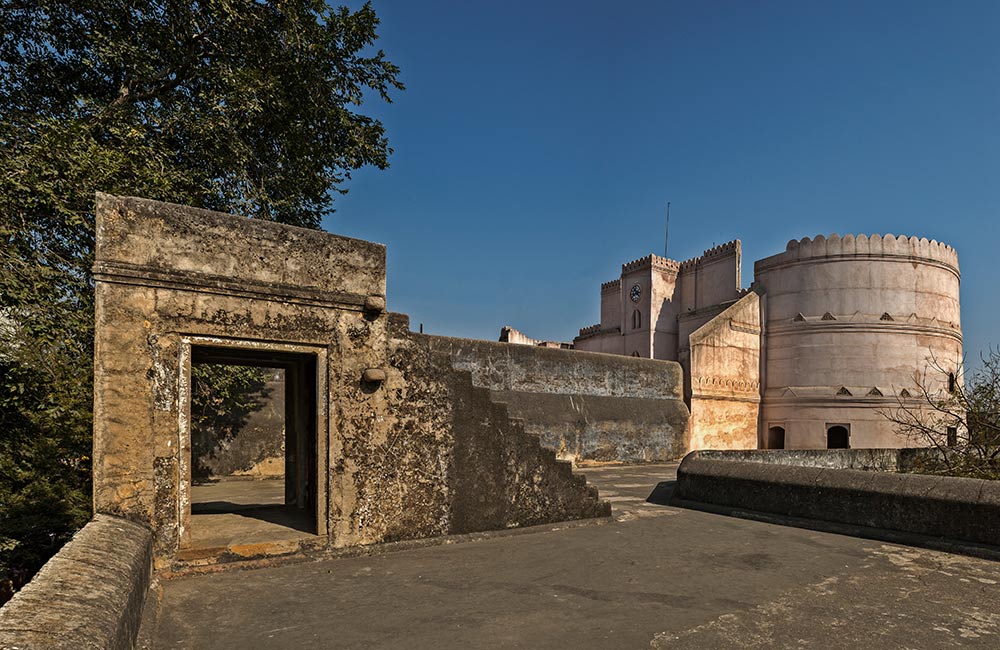
Bhadra Fort | #2 of 13 Historical Places in Ahmedabad
Bhadra Fort, built in 1411 by Sultan Ahmed Shah, houses many royal palaces, lavish gardens, mosques, huge gates, watchtowers, and open spaces within its premises. It also has a shrine dedicated to Bhadra Kali, which was established during the Maratha rule. You can even find a splendid clock tower here installed by the British East India Company in 1878.
The fort may have lost much of its original splendor, but it is still one of the most renowned tourist places in Ahmedabad that narrate the story of the city’s glorious past.
- Location: Court Road, Ahmedabad
- Timings: 9:00 am to 5:00 pm
- Entry Fee: Free
3. Teen Darwaza, Ahmedabad
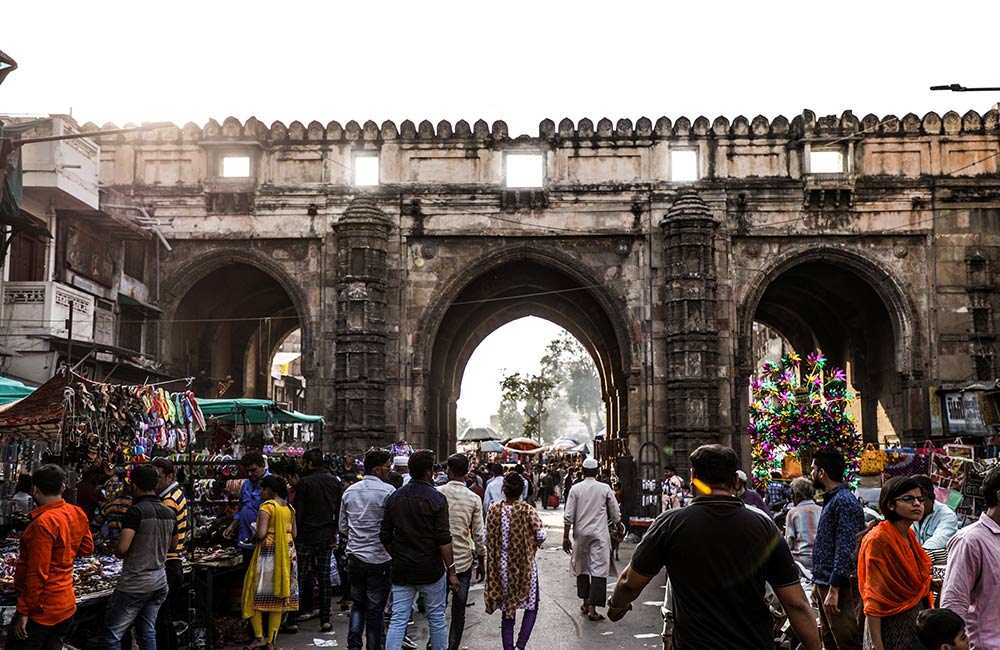
Teen Darwaza | #3 of 13 Historical Places in Ahmedabad
Teen Darwaza, the eastern gateway to the Bhadra Fort, is another major historical landmark in the city. In fact, this entrance gateway is so iconic that it has been featured in Ahmedabad Municipal Corporation’s logo. The structure was built in 1415 by Ahmed Shah, and has three arches; hence the name.
While here, don’t miss out on checking the inscription on the gate’s pillar. Made in 1812 by Chimnaji Raghunath – a Maratha governor, the inscription declares women’s equal right to inherit ancestral property. There are many shops in the area selling all kinds of knick-knacks so you can do a little bit of shopping after visiting the gate and the fort.
- Location: Court Road, Ahmedabad
- Timings: 9:00 am to 9:00 pm
- Entry Fee: Free
4. Sarkhej Roza, Ahmedabad
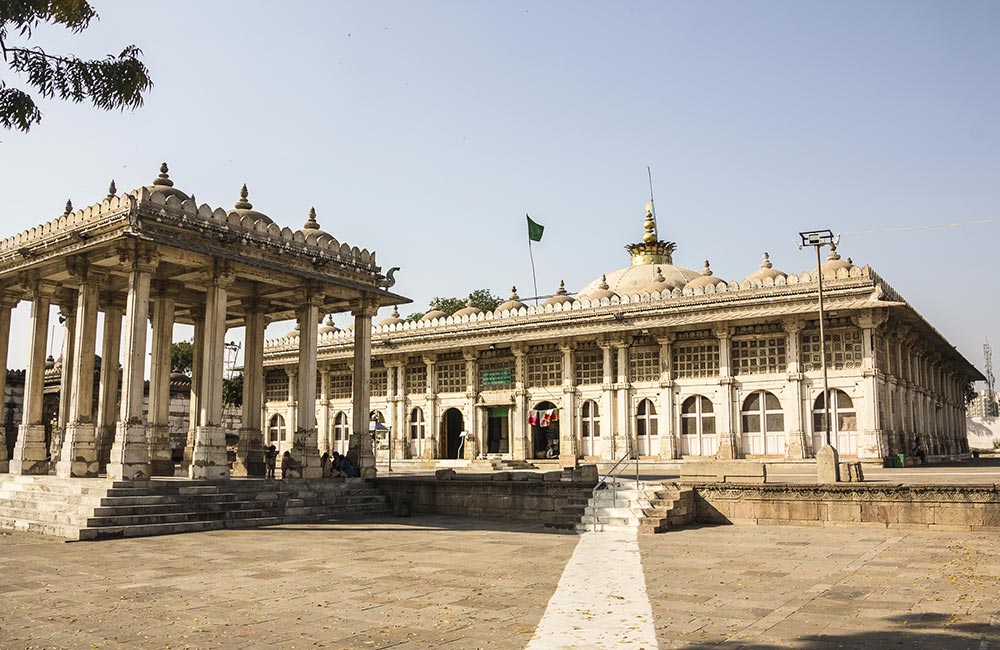
Sarkhej Roza | #4 of 13 Historical Places in Ahmedabad
The historical complex of Sarkhej Roza, built at the onset of the Sultanate era, comprises a mosque and several tombs. Though there are several Rozas spread across Gujarat, Sarkhej Roza attracts visitors with its striking architecture, which is a fine blend of Indian and non-Indian styles.
Intricate carvings, ornamental motifs, and splendid latticework adorning the complex are some of the factors that make Sarkhej Roza one of the most beautiful historical places to visit in Ahmedabad.
- Location: Sarkhej Makarba Road, Ahmedabad
- Timings: 9:00 am to 6:00pm
- Entry Fee: Free
Also Read: Monuments in India
5. Jama Masjid, Ahmedabad
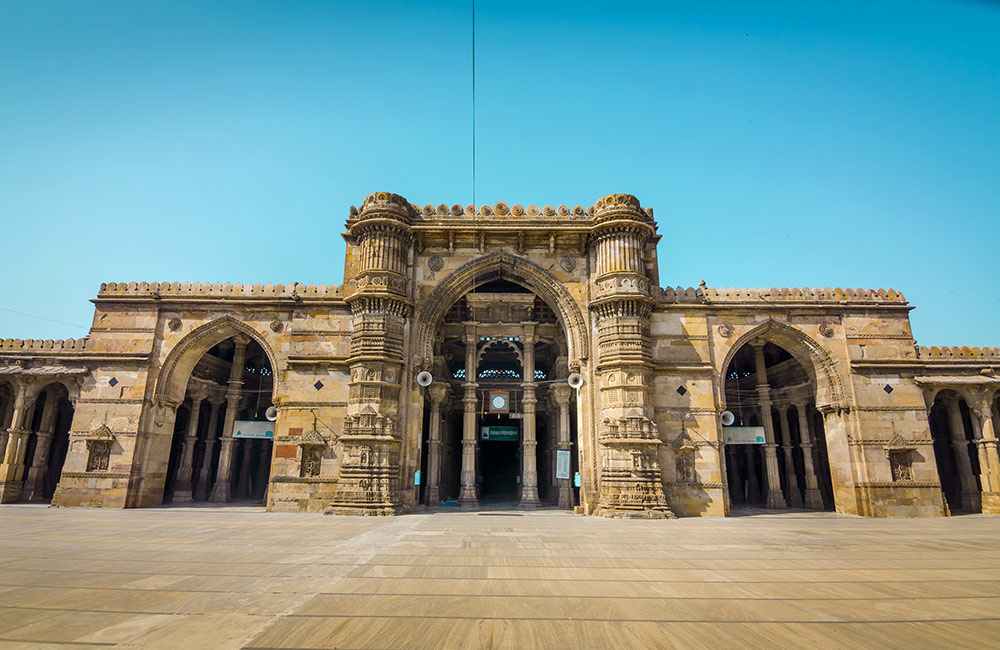
Jama Masjid | #5 of 13 Historical Places in Ahmedabad
When Sultan Ahmed Shah built the colossal Jama Masjid in 1424, it was one of the largest mosques in India at the time. Located in the old walled city, this gorgeous mosque stands right outside Bhadra Fort.
The mosque is built in yellow sandstone and is a fine example of the Indo-Saracenic style of architecture. There are over 260 columns in the main prayer hall, covered by 15 domes. It is believed that the mosque was constructed using the stones obtained from demolished Jain and Hindu temples.
- Location: Manek Chowk, Ahmedabad
- Timings: 6:00 am to 10:00 pm
- Entry Fee: Free
6. Shah-e-Alam’s Roza, Ahmedabad
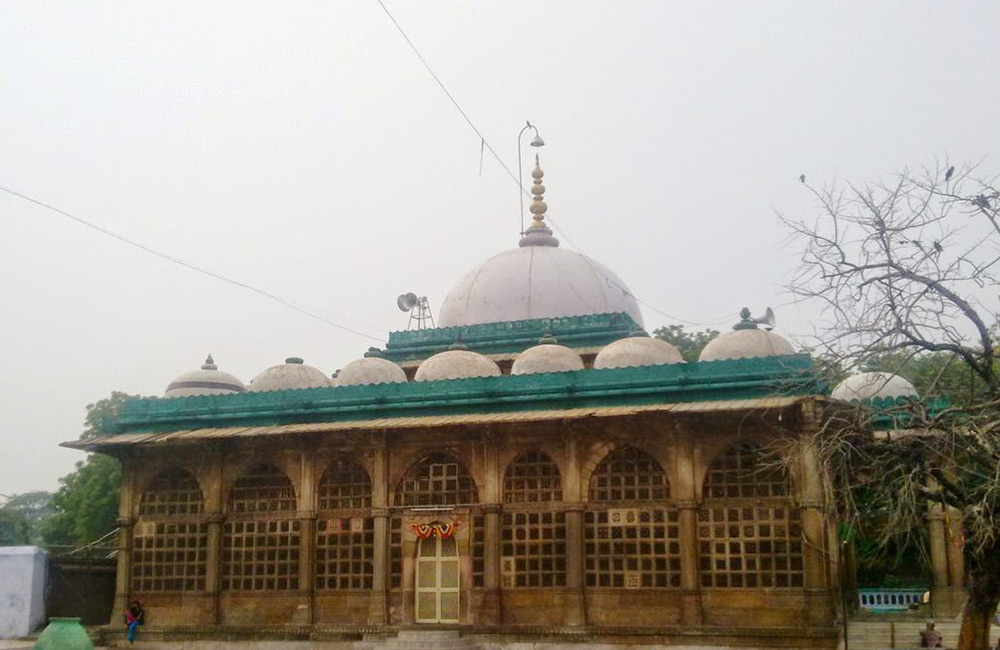
Shah-e-Alam’s Roza | #6 of 13 Historical Places in Ahmedabad
Also called Rasulabad Dargah and Shah Alam no Rojo, Shah-e-Alam’s Roza is a magnificent complex with a mosque and tomb, tracing its roots to the medieval era. Counted among the top historical places in Ahmedabad, Shah-e-Alam’s Roza boasts of outstanding architecture. It is said that its dome was once decorated with gold and precious stones. Today, the Roza may not display such grandeur, but it still retains its structural beauty and serenity.
Apart from Shah-e-Alam’s tomb, the complex houses tombs of other members of his family.
- Location: Shah Alam Road, Ahmedabad
- Timings: Morning to Evening
- Entry Fee: Free
7. Rani no Hajiro, Ahmedabad
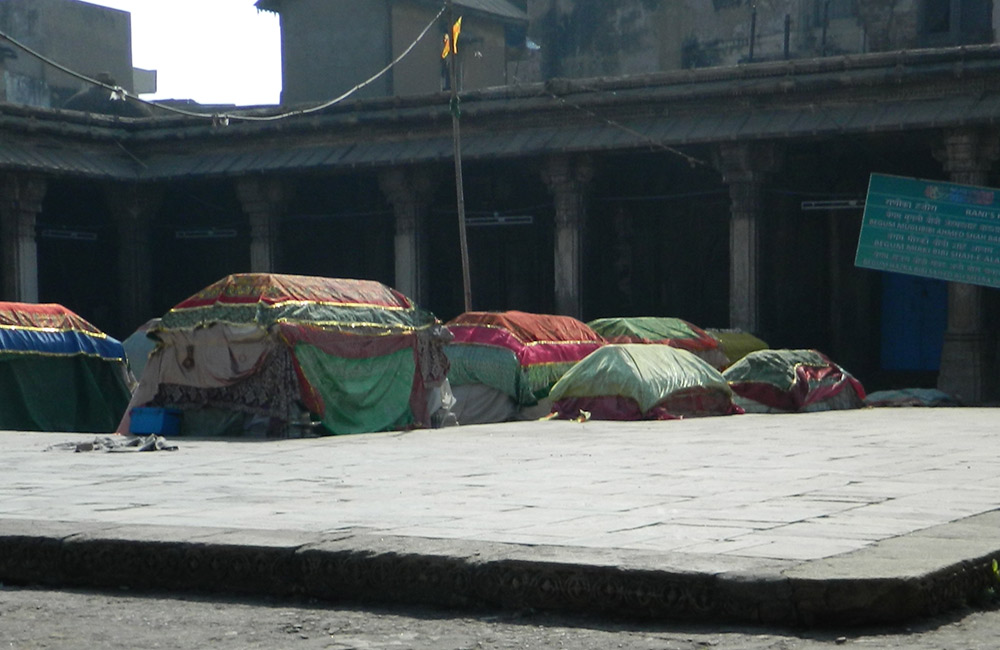
Rani no Hajiro | #7 of 13 Historical Places in Ahmedabad
If you walk around the Manek Chowk area, you will come upon a high enclosure with a lofty gateway wherein the graves of Sultan Ahmed Shah’s consorts lie. Hence, this tomb complex is known as Rani no Hajiro or Mughalai Bibi’s Tomb, which means the Queen’s tomb. Unlike the other tomb complexes in the city, this one has the graves placed in an open courtyard. Covered in rich brocade works, these mausoleums display intricate carvings that are a blend of Jain, Islamic, and Hindu architectural styles.
While here, do not forget to explore the area around the tomb complex, which is one of the liveliest shopping places in Ahmedabad. You can shop for traditional Garba dresses, jewelry, accessories, and many other things here.
- Location: Manek Chowk, Ahmedabad
- Timings: 6:00 am to 6:00 pm
- Entry: Free
8. Hutheesing Jain Temple, Ahmedabad
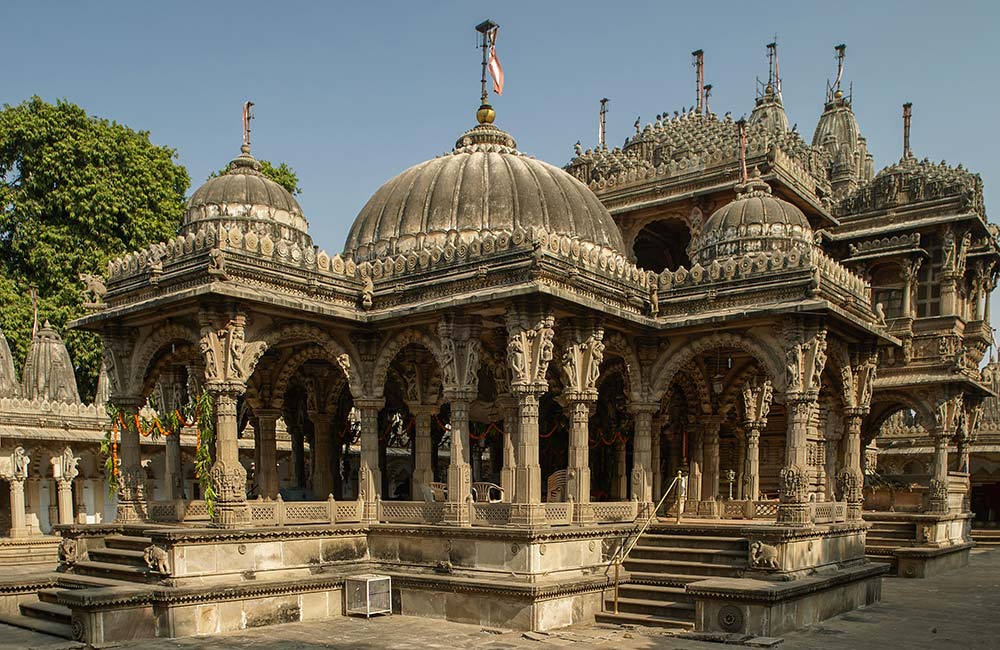
Hutheesing Jain Temple | #8 of 13 Historical Places in Ahmedabad
Hutheesing Jain Temple is one of the most prominent Jain shrines in Ahmedabad, dedicated to the 15th Tirthankara, Lord Dharmanatha. An affluent trader from Ahmedabad named Shet Hathisinh Kesarisinh initiated the construction of this temple. After his death, the work was completed by his wife in 1848 at a cost of about eight lakh rupees.
The architectural style followed here is similar to that of Dilwara Jain Temples of Rajasthan. Apart from the main temple, this religious complex has 52 smaller shrines dedicated to the other Jain Tirthankaras.
- Location: Shahibaug Road, Ahmedabad
- Timings: 8:00 am to 1:00 pm and 2:00 pm to 5:00 pm; every day
- Entry: Free
9. Dada Harir Vav, Ahmedabad
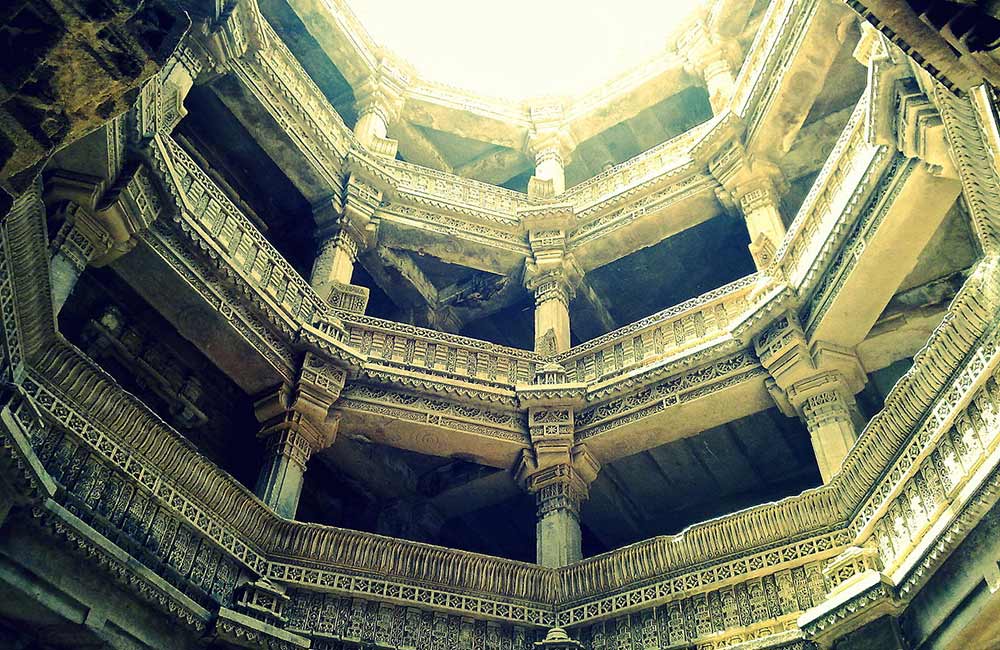
Dada Harir Vav | #9 of 13 Historical Places in Ahmedabad
Dada Harir Vav, another must-visit historical attraction in Ahmedabad, is an intricately-built stepwell. As per the inscription on the stepwell, it was constructed in the year 1485 by Dhai Harir, who served as the Superintendent of the royal harem of Sultan Mahmud Begada.
If you walk down the steps of this five-storied well, you will notice the beautiful carvings on its walls. Built using sandstone in Solanki architectural style, this historic stepwell exhibits an intricate play of stairs and landings.
- Location: Haripura, Ahmedabad
- Timings: 9:00 am to 5:00 pm
- Entry Fee: Free
10. Siddi Saiyed Mosque, Ahmedabad
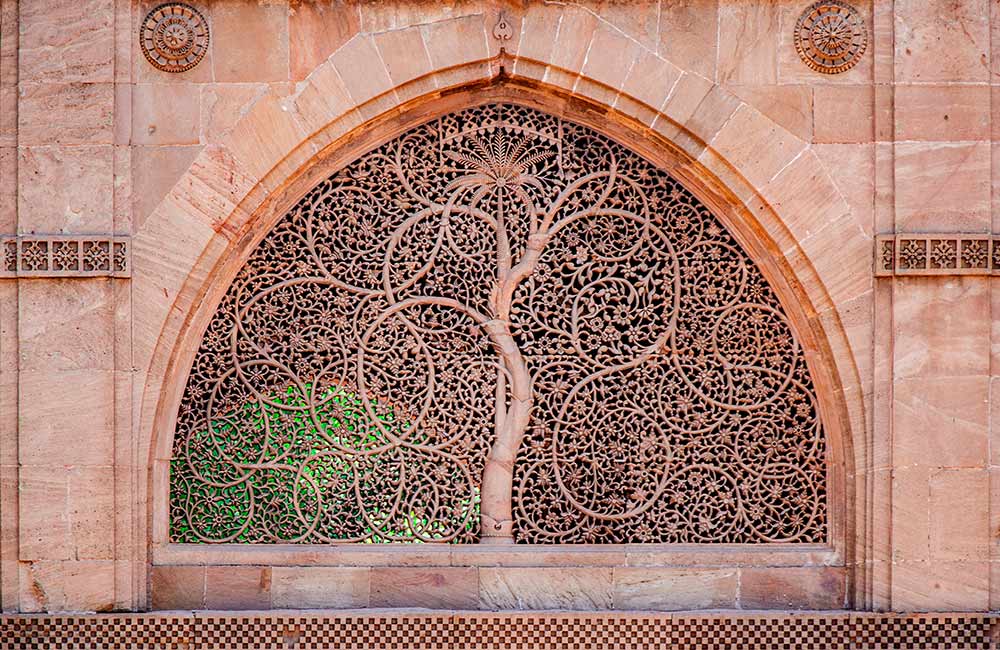
Siddi Saiyed Mosque | #10 of 13 Historical Places in Ahmedabad
Also referred to as Sidi Saiyyed Ni Jaali, this historical mosque in Ahmedabad is known for its stunning architectural beauty. It was constructed in 1573 by Sidi Saiyyid and is located in the center of the city. A unique feature of this religious center is that it has 10 intricately-carved windows adorned with stone latticework on the rear arches and sides.
Interestingly, this latticework has been the inspiration for the logo design of Ahmedabad IIM (Indian Institute of Management).
- Location: Gheekanta, Ahmedabad
- Timings: 7:00 am to 6:00 pm
- Entry Fee: Free
11. Calico Textile Museum, Ahmedabad
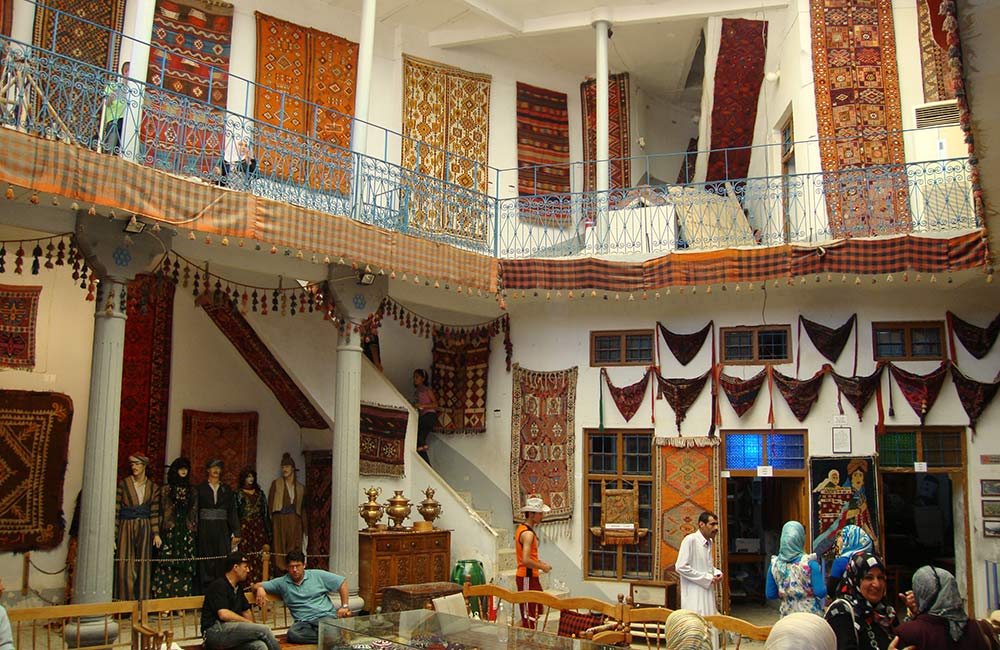
Calico Textile Museum | #11 of 13 Historical Places in Ahmedabad
The textile industry has played a major role in shaping the history of modern Ahmedabad, which is often known as the Manchester of the East. The Calico Textile Museum, one of the oldest museums in Ahmedabad, is an ode to the city’s rich textile heritage.
Founded by industrialist Gautam Sarabhai and his sister Gira Sarabhai in 1949, this museum exhibits a rare collection of costumes, carpets, exquisite silk weaves, Kashmiri shawls, and court textiles used by the Mughals and other rulers dating from 15th to 19th centuries. The museum is housed in a lovely wooden haveli.
- Location: Airport Road, Ahmedabad
- Timings: 10:30 am to 1:00 pm; closed on Wednesdays
- Entry Fee: Free; prior permission required
12. Adalaj Vav, Ahmedabad
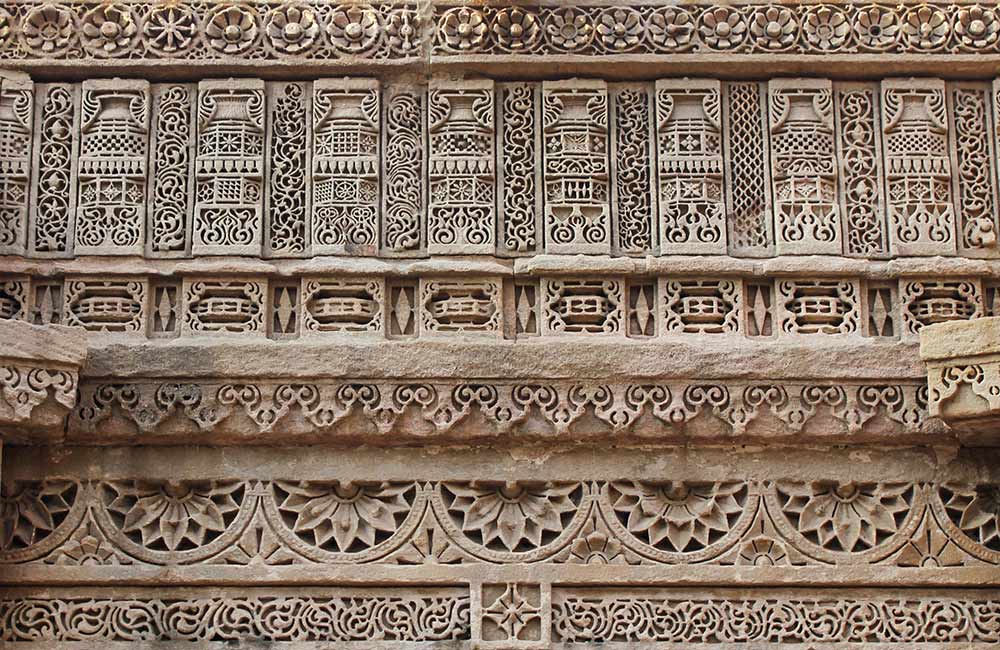
Adalaj Vav | #12 of 13 Historical Places in Ahmedabad
Another one of the historic stepwells in and around Ahmedabad, Adalaj Vav is located in the namesake village on the outskirts of the city. It was constructed by Queen Rudadevi in 1498 to commemorate Rana Veer Singh – her husband and is thus also known as Rudabai Vav.
The five-storied structure is built using sandstone in the Solanki architectural style, featuring large pillars, stairways, and intricate carvings.
- Location: Adalaj
- Distance from Ahmedabad: 20 km
- Timings: 6:00 am to 6:00 pm
- Entry Fee: Free
13. Jhulta Minara, Ahmedabad
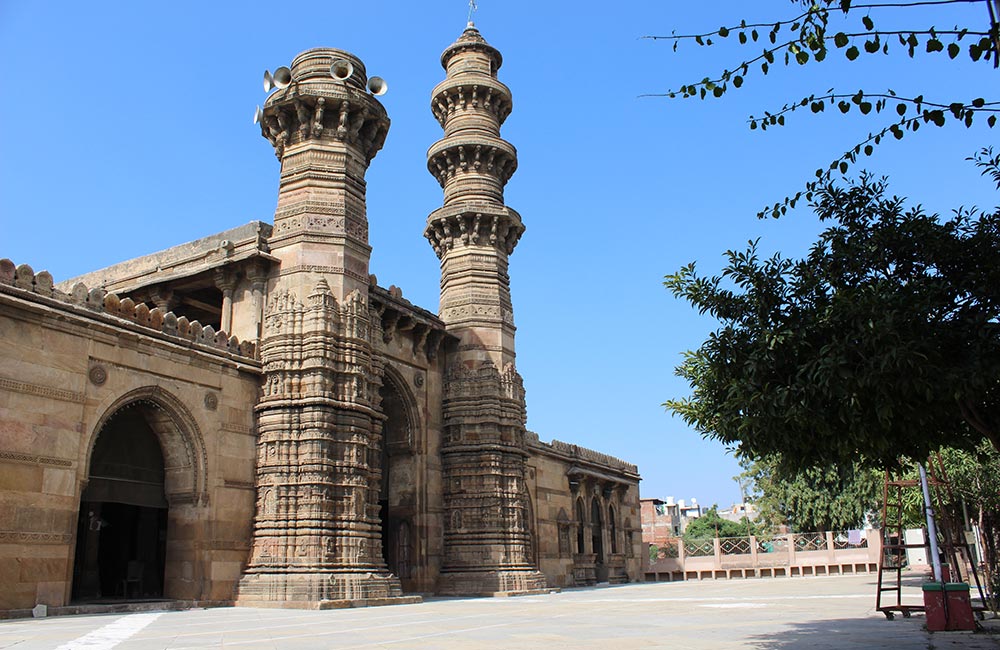
Adalaj Vav | #13 of 13 Historical Places in Ahmedabad
Your trip to the historical places in Ahmedabad cannot be deemed complete without a visit to Jhulta Minara or Shaking Minarets, an intriguing architectural wonder. The two minarets once served as the gateway to the 500-plus-years-old Sidi Bashir Mosque.
A unique feature of these minarets is that if you shake either one of them by applying a little force, the other one starts vibrating in just a few seconds. Hence the name; but the passage that connects these two minarets does not experience any vibrations. Many experts tried to unravel the mystery behind this unique architectural phenomenon, but in vain. Read also – Weekend getaways in Ahmedabad
- Location: Sakar Bazar, Ahmedabad
- Timings: 5:30 am to 9:00 pm
- Entry Fee: Free


